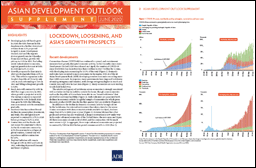Monday 29 June 2020
Asian Development Outlook 2020 Supplement
MANILA (ADB press service) — The Asian Development Bank (ADB) has recently released a supplement to its Outlook 2020. This publication provides updated economic forecasts for Asia and the Pacific, taking into consideration the impact of coronavirus disease (COVID-19).
Developing Asia is now projected to grow by only 0.1% in 2020, which would be the lowest regional growth outcome since 1961. Contraction is expected in all sub-regions except in East Asia.
However, ADB experts think growth will rebound to 6.2% in 2021 but composite GDP next year will remain below its pre-crisis trend, so the recovery will not be V-shaped. Excluding newly industrialized economies, regional growth is forecast at 0.4% in 2020 and 6.6% in 2021. Regional inflation is expected to remain benign at 2.9% in 2020 and 2.4% in 2021.
Central Asia
The COVID-19 pandemic prompts a downward adjustment to the 2020 projection for Central Asia (ADB includes Azerbaijan, Armenia and Georgia) from 2.8% growth to 0.5% contraction. The 4.2% growth projection for 2021 is unchanged.
The 2020 forecast for Kazakhstan, the largest economy in the sub-region, is revised down from 1.8% growth to 1.2% contraction, with the growth forecast for 2021 only marginally adjusted from 3.6% to 3.4%. The first 4 months of 2020 saw contraction by 0.2% year on year. The service sector was the most significantly affected, shrinking by 4%, while growth remained positive in the rest of the economy. Mining grew by 6%, primarily from oil and gas extraction, but such growth is unlikely in the rest of this year as Kazakhstan adheres to oil production cuts agreed by the Organization of the Petroleum Exporting Countries and others (OPEC+).
In Tajikistan, an estimated 500,000 migrant workers — 5.2% of the whole population — were unable to return to work abroad at the start of the 2020 migrant work season because of rapidly falling oil prices in Q1 of 2020 and other negative impacts on the Russian Federation caused by COVID-19.
In the Kyrgyz Republic, COVID-19 disrupted imports of raw materials, equipment, and food from the PRC and other major trade partners, and remittances are expected to fall with economic slowdowns in Kazakhstan and the Russian Federation.
Despite the absence of officially reported COVID-19 cases, the economy of Turkmenistan has been hit hard by trade disruption and low oil and gas prices.
Remittances into Uzbekistan are expected to decline until the beginning of 2021 as migrant workers are unable to travel to seasonal employment in the Russian Federation, and demand for export commodities remains weak throughout 2020.


